Welcome to another Tinto Talks, this is the 9th of its kind, where we talk about our very secret game using the codename Project Caesar. And today we continue with the 3rd of the 4 talks we have now about the economy systems of the game. So lets start..
Constructions
In the previous development diary, we mentioned constructions and how you needed lumber for expanding the mines. In this game, almost all constructions require different materials to progress, and if that material is not available in the local market, then that construction is stalled until the material is available. This includes things like road building, shipbuilding, recruiting regiments, building buildings, or expanding R.G.O’s.
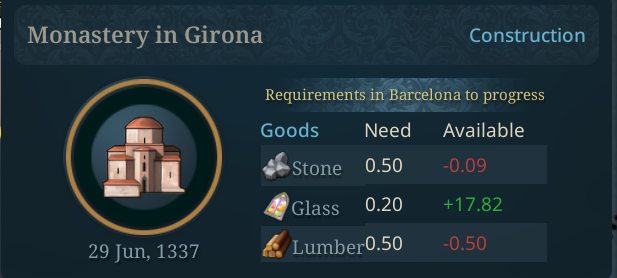
Not sure why you want another monastery?
For example, building a light ship in the Age of Renaissance requires Naval Supplies, Lumber, Weaponry, Copper, Tin, and Metalworks, while moving your capital requires Paper, Books, Stone, Lumber, Marble, and gold.
Buildings
Buildings are rather important in Project Caesar. There are hundreds of different types of buildings, some can only be built in rural locations, and some require a town or city. Some can only be built in ports, and some can only be built in other countries. Some you can only build when there is no owner of a location. Lots of buildings are unique to cultures, regions, religions, or even to specific tags.
Some buildings can only have 1 level, some have a fixed cap, and some have a cap that scales with the population or development, and so on.
Buildings can also be categorized into three different categories: buildings that can produce goods, buildings that only give effects, and buildings that can only be built by the estates. Those pure estates usually have a drawback to them as well, and it's not easy to remove them
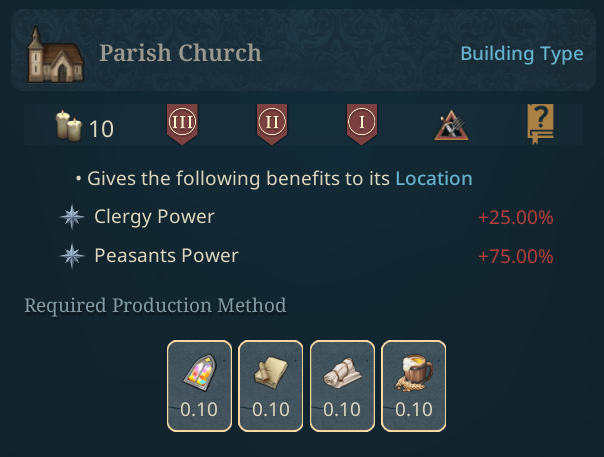
Definitely not something we are all that keen on having in here.. it does increase demands for some goods though..
So what about producing buildings then? This is where the truly fun parts of the economy start. Project Caesar has a large amount of different goods. We currently have about 70 different ones that have different needs, some are needed for the military, some are needed solely by pops, some are needed for buildings, and so on.
Producing Buildings in towns and cities go from guilds and workshops to manufactories and mills at the of the game. These include everything from Paper Makers Guilds to Foundries. A producing building outputs one or more types of goods.
Finally, we have buildings that are purely giving an effect. These include Granaries that increase how much food you can store, libraries that increase literacy, different types of forts, buildings that train manpower, port buildings to help with shipbuilding, and much more.
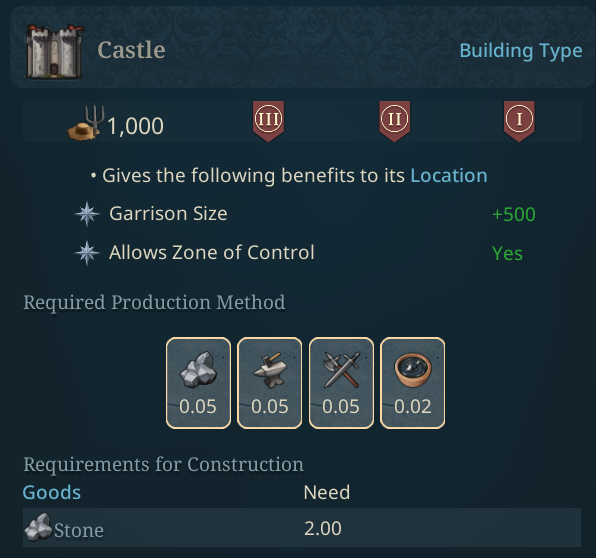
Some claim you can build Stockades of wood, but we trust only stone!
Almost all buildings though, have a production method, which impacts how they work.
Production methods
All buildings have at least one production method slot with one production method, but many have different methods in each slot, and there are plenty of buildings with multiple production method slots.
What is a production method then?
A production method is a list of goods that are required for a building to function. There are two categories of production methods, those that produce something and those that do not.
As an example, a Castle does not produce any goods, but it still requires Stone, Metalworks, Weaponry, and Tar to function, and if it does not get those goods, then the Castle will not function properly. The effectiveness of a building is based on the lowest available percentage of goods present, and it will only purchase and use required materials in that percentage required. If the market cannot supply enough resources, then it will not work.
The output of the producing building is also scaled by the percentage mentioned above.
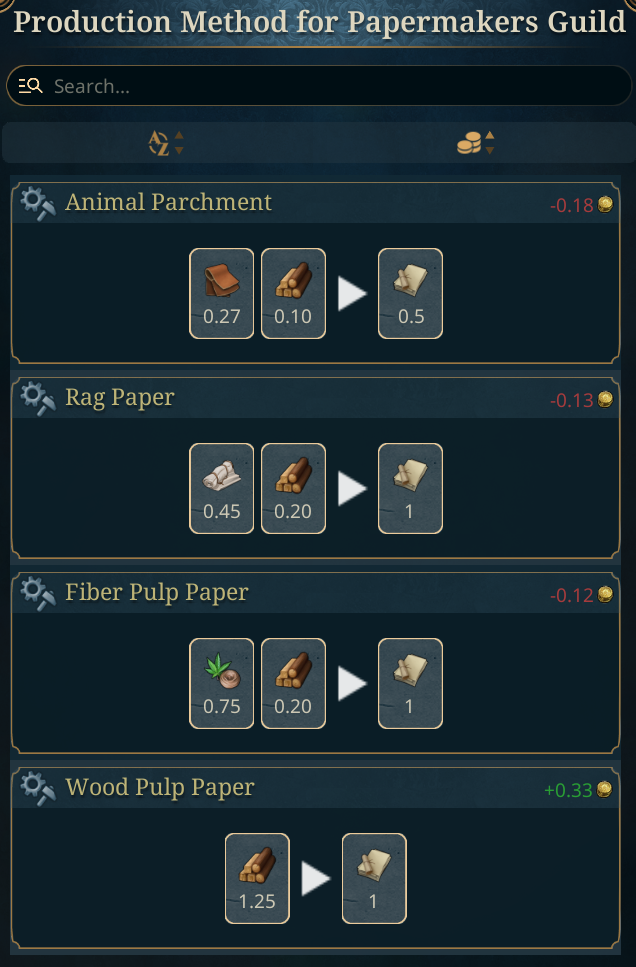
There are a few options here, but only wood pulp would be profitable here, probably because of the great supply of lumber in this market..
And of course, you can automate the production method selection, which will adapt it on a monthly basis based on what resources are available and what would be profitable. The UI also allows for macro decisions regarding production methods
Other important aspects
Every building requires employed pops to function as well, and those that require “upper class” pops like burghers, clergy, and nobles, also increase the potential for them in the location, making pops slowly promoted. This can be slightly awkward as powerful nobles or clergy construct more buildings that make them more numerous and powerful.
Producing buildings that are not profitable will be closed, and pops will work in other buildings, however, you can always subsidize a building if you require the goods or other benefits it gives.
Speaking of profit. The profit of a building is added to the Tax Base of a location, split among the power of the population in the location.
You can always close and open a building, if you want to manipulate prices, or if you want your pops to work with other things, and you don’t want to destroy a building permanently.
We mentioned last week about different ways to get raw materials, and one way to get it, besides trade, is through a set of rural buildings. These include Lumber Mills that you can build in any wood or forest location to produce lumber, sheep farms, stone quarries, and many more.
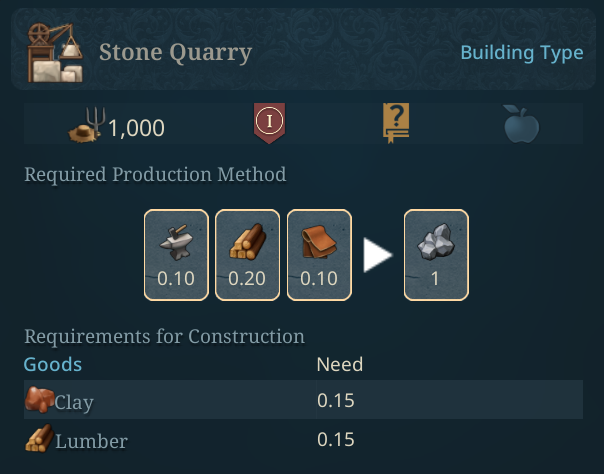
Yeah, this requires some input.. Might be worth it..
There are stockpiles of goods, but those are in the market. There are buildings you can build that increase the amount they can store, as if you do not have the goods required for a building, unit, or construction, those will not function.
Speaking of markets, that is something we will talk about more next week when we delve deep into the trade system.
Constructions
In the previous development diary, we mentioned constructions and how you needed lumber for expanding the mines. In this game, almost all constructions require different materials to progress, and if that material is not available in the local market, then that construction is stalled until the material is available. This includes things like road building, shipbuilding, recruiting regiments, building buildings, or expanding R.G.O’s.
Not sure why you want another monastery?
For example, building a light ship in the Age of Renaissance requires Naval Supplies, Lumber, Weaponry, Copper, Tin, and Metalworks, while moving your capital requires Paper, Books, Stone, Lumber, Marble, and gold.
Buildings
Buildings are rather important in Project Caesar. There are hundreds of different types of buildings, some can only be built in rural locations, and some require a town or city. Some can only be built in ports, and some can only be built in other countries. Some you can only build when there is no owner of a location. Lots of buildings are unique to cultures, regions, religions, or even to specific tags.
Some buildings can only have 1 level, some have a fixed cap, and some have a cap that scales with the population or development, and so on.
Buildings can also be categorized into three different categories: buildings that can produce goods, buildings that only give effects, and buildings that can only be built by the estates. Those pure estates usually have a drawback to them as well, and it's not easy to remove them
Definitely not something we are all that keen on having in here.. it does increase demands for some goods though..
So what about producing buildings then? This is where the truly fun parts of the economy start. Project Caesar has a large amount of different goods. We currently have about 70 different ones that have different needs, some are needed for the military, some are needed solely by pops, some are needed for buildings, and so on.
Producing Buildings in towns and cities go from guilds and workshops to manufactories and mills at the of the game. These include everything from Paper Makers Guilds to Foundries. A producing building outputs one or more types of goods.
Finally, we have buildings that are purely giving an effect. These include Granaries that increase how much food you can store, libraries that increase literacy, different types of forts, buildings that train manpower, port buildings to help with shipbuilding, and much more.
Some claim you can build Stockades of wood, but we trust only stone!
Almost all buildings though, have a production method, which impacts how they work.
Production methods
All buildings have at least one production method slot with one production method, but many have different methods in each slot, and there are plenty of buildings with multiple production method slots.
What is a production method then?
A production method is a list of goods that are required for a building to function. There are two categories of production methods, those that produce something and those that do not.
As an example, a Castle does not produce any goods, but it still requires Stone, Metalworks, Weaponry, and Tar to function, and if it does not get those goods, then the Castle will not function properly. The effectiveness of a building is based on the lowest available percentage of goods present, and it will only purchase and use required materials in that percentage required. If the market cannot supply enough resources, then it will not work.
The output of the producing building is also scaled by the percentage mentioned above.
There are a few options here, but only wood pulp would be profitable here, probably because of the great supply of lumber in this market..
And of course, you can automate the production method selection, which will adapt it on a monthly basis based on what resources are available and what would be profitable. The UI also allows for macro decisions regarding production methods
Other important aspects
Every building requires employed pops to function as well, and those that require “upper class” pops like burghers, clergy, and nobles, also increase the potential for them in the location, making pops slowly promoted. This can be slightly awkward as powerful nobles or clergy construct more buildings that make them more numerous and powerful.
Producing buildings that are not profitable will be closed, and pops will work in other buildings, however, you can always subsidize a building if you require the goods or other benefits it gives.
Speaking of profit. The profit of a building is added to the Tax Base of a location, split among the power of the population in the location.
You can always close and open a building, if you want to manipulate prices, or if you want your pops to work with other things, and you don’t want to destroy a building permanently.
We mentioned last week about different ways to get raw materials, and one way to get it, besides trade, is through a set of rural buildings. These include Lumber Mills that you can build in any wood or forest location to produce lumber, sheep farms, stone quarries, and many more.
Yeah, this requires some input.. Might be worth it..
There are stockpiles of goods, but those are in the market. There are buildings you can build that increase the amount they can store, as if you do not have the goods required for a building, unit, or construction, those will not function.
Speaking of markets, that is something we will talk about more next week when we delve deep into the trade system.


